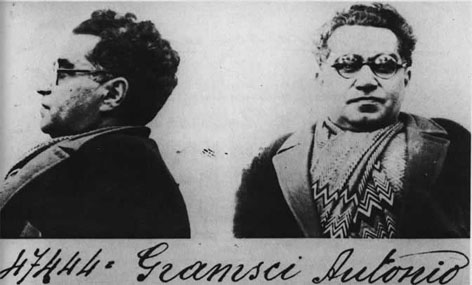In Antonio Gramsci’s first Prison Notebook—he wrote 29 of them—he’s still using hegemony in the sense of a crude political leadership, much in the same way as he used it in his seminal essay “Some Aspects of the Southern Question.” In fact, entry Q1§44 is kind of a continuation of the Southern Question.
Later on in the notebook, he gives what has become the standard—still crude—description of hegemony: “The ‘normal’ exercise of hegemony on the now classic terrain of the parliamentary regime is characterized by a combination of force and consent which balance each other so that force does not overwhelm consent but rather appears to be backed by the consent of the majority, expressed by the so-called organs of organs of public opinion (which in certain situations, therefore, are artificially multiplied)” (155-156, Q1§48). This is certainly one place Guha and others of the Subaltern crowd is drawing from.
But the conceptual girth of the concept-fact of hegemony grows along with the crescendo of the Notebooks. Subtle shifts begin. In Notebook Four he’s beginning to try to piece together how hegemony works on the brain and practices of the living in a way that they transcend their narrowly construed economic-corporate interests and thus forming a viable bloc with other groups that can “ascend” to power: The problem “has to do with a subaltern group that is prevented by this theory [syndicalism] from ever becoming dominant: prevented, that is, from leaving behind the economic-corporate phase in order to advance to the phase of politico-intellectual hegemony in civil society and become dominant in political society (183, Q4§38). The shift is subtle but the main change centers on the turn of phrase that is politico-intellectual, which connotes something far richer than just “leadership” or “consent.”
In another key entry of the Notebooks (at least the ones I’ve read; c’mon Buttigieg, you can do it!!), Gramsci writes:
It is likewise strange that posing concretely the question of hegemony should be interpreted as something that subordinates the hegemonic group [or others presumably]. Obviously, the fact of hegemony presupposes that the interests and tendencies of those groups over whom hegemony is exercised have been taken into account and that a certain equilibrium is established. It presupposes, in other words, that the hegemonic group should make sacrifices of an economic-corporate kind, these sacrifices, however, cannot touch the essential; since hegemony is political but also and above all economic, it has its material base in the decisive function exercised by the hegemonic group in the decisive core of economic activity. (183, Q4§38)
So here he’s linking it back to a series of political-economic interests that are being worked out and fused together in a viable equilibrium. But only to a point! If the latter part of the note rings far too economistic, then consider what he writes just a few paragraphs later: before he introduces hegemony precisely as a political praxis—a concept-fact—against vulgar economism.
Yet, one can’t deny that there is a lingering econo-centrism in his development of the concept, but then he also gives it a much broader purchase by tying it to a realm of critical self-awareness and consciousness: “In view of what was stated above—namely, that the value of Marx’s assertion—that men become conscious of economic conflicts on the terrain of ideology—is epistemological and not psychological or moral; it follows that the value of the concept of hegemony, too, is epistemological” (187, Q4§38).
Later Notebooks, such as Eight, build on this much more ideological notion of hegemony:
The practical-theoretical position, in this case, cannot help becoming ‘political’—that is, a question of ‘hegemony.’ Consciousness of being part of a hegemonic force (that is, political consciousness) is the first stage on the way to greater self-awareness, namely, on the way to unifying practice and theory. The unity of theory and practice is not a mechanical fact; it is, rather, a historical process, the elementary and primitive phase of which consists in the sense of being ‘distinct,’ ‘apart,’ and ‘independent.’ This is why I pointed out elsewhere that development of the concept-fact of hegemony represented a great ‘philosophical’ as well as a political-practical advance. (330, Q8§169)
He chalks this advance to Lenin, but I think Gramsci’s development takes the idea into much more fertile terrain. (On this note, I take Perry Anderson and Laclau and Mouffe’s points to heart.
Nothing gives a better understanding of how Gramsci believed hegemony worked than his obsession with popular literature and his (related) college-age forays into linguistics, geography and philology. In a discussion of French popular literature as formative of a “national-popular” culture, Gramsci suggests, “The attitude of French philosophical culture toward ‘common sense’ might even provide a model of hegemonic cultural construction” (334, Q8§173). Common sense is the very stuff of hegemony and he believed popular novels did a tremendous amount of work in building hegemonic conceptions of the world. Gramsci spent pages and pages of notes analyzing these texts for what could be called the micro-technologies of hegemony.
 Some have traced how Gramsci’s linguistic studies, which coincided with Giulio Bertoli’s innovative theories of how speech communities mutually interacted with one usually becoming more dominant, greatly influenced his thinking about hegemony. In Antonio Gramsci: Selections form the Cultural Writings, the editors note: “For Gramsci linguistic relations are not only representations and historical traces of past and present power relations but are also paradigms for other relations of cultural influence and prestige: elaborated philosophical conceptions of the world over unelaborated folkloric ones … high over popular literature … the network of a press emanating from a homogeneous cultural centre…” (165).
Some have traced how Gramsci’s linguistic studies, which coincided with Giulio Bertoli’s innovative theories of how speech communities mutually interacted with one usually becoming more dominant, greatly influenced his thinking about hegemony. In Antonio Gramsci: Selections form the Cultural Writings, the editors note: “For Gramsci linguistic relations are not only representations and historical traces of past and present power relations but are also paradigms for other relations of cultural influence and prestige: elaborated philosophical conceptions of the world over unelaborated folkloric ones … high over popular literature … the network of a press emanating from a homogeneous cultural centre…” (165).
I’m not saying Gramsci left his previous ideas about hegemony totally behind, though some I think he did; I think he’s just recursively building on them and refining them. The way I like to define it: Hegemony describes a fluid process of struggle through which certain social relations are naturalized and coercively enforced, while others are made unviable and even unthinkable.
On a final note: I’m still struck by Gramsci’s lack of serious attention to violence. He has some tantalizingly short bits on fascist paramilitaries and mafias, but never dives in. I think questions of violence along with clearer notions of coercion and force remain important (and surprising) silences in his work.


Pingback: Lefebvre: State, Space, World | Territorial Masquerades
Pingback: Spatiality and Power | Territorial Masquerades